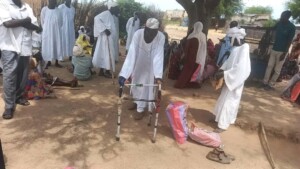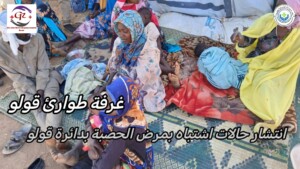Cholera still spreading in Sudan; UN mission visits Central Darfur
At least ten Darfuris died of cholera last week. A joint UN-Sudanese mission visited Central Darfur “to report on gaps and challenges in the Acute Watery Diarrhoea response activities”. New cases have been recorded south of Khartoum, in eastern Sudan, and in the Northern State.
“Cholera has returned to Kalma,” a medical source told Radio Dabanga. “Seven patients died since Monday.
“In total there are 32 patients being treated in the isolation units in the camp,” he said. “More than 20 of them are in the isolation centre allocated for Blocks 8 and 9.”
At least ten Darfuris died of cholera last week. A joint UN-Sudanese mission visited Central Darfur “to report on gaps and challenges in the Acute Watery Diarrhoea response activities”. New cases have been recorded south of Khartoum, in eastern Sudan, and in the Northern State.
“Cholera has returned to Kalma,” a medical source told Radio Dabanga. “Seven patients died since Monday.
“In total there are 32 patients being treated in the isolation units in the camp,” he said. “More than 20 of them are in the isolation centre allocated for Blocks 8 and 9.”
The first cases of cholera in South Darfur appeared at Kalma camp, near Nyala, capital of South Darfur. Kalma, which hosts more than 120,000 displaced, is one of the largest camps in Darfur.
Central Darfur
El Shafee Abdallah, Coordinator of of the Central Darfur camps for the displaced, told Radio Dabanga that three residents of Hamidiya camp died of cholera on Wednesday.
“There are currently 26 patients being treated at the medical isolation centre of the Zalingei Royal Hospital,” he reported.
“Seven of them come from the camps of Hamidiya, Hassahissa, and Khamsa Dagayig and were admitted on Wednesday and Thursday. The rest of the patients are from the surroundings of Zalingei.”
Khartoum refuses to acknowledge the spread of cholera, and instead calls it “watery diarrhoea”.
In early August, representatives from the Sudanese Ministry of Health, the World Health Organization, the UN Development Programme, the UN Refugee Agency, and the UN Office for the Coordination of Humanitarian Affairs (OCHA) visited Central Darfur “to report on gaps and challenges in the Acute Watery Diarrhoea (AWD) response activities”.
“Humanitarian access and insecurity remain major challenges for the implementation of key health and protection interventions in the area,” OCHA reported in its latest biweekly bulletin.
Six localities in the state require isolation centres to be established as soon as possible, the mission found.
“Additionally, Nierteti's hospital faces gaps in medicines, including oral and intravenous re-hydration solutions, which are needed in the treatment of AWD,” OCHA states. “In Zalingei hospital, there are several sanitation issues, including lack of latrines and evidence of improper solid waste management [..].”
El Managil
 More than 70 new cholera cases were recently recorded in various parts of El Managil locality in El Gezira, between the White and Blue Nile south of Khartoum.
More than 70 new cholera cases were recently recorded in various parts of El Managil locality in El Gezira, between the White and Blue Nile south of Khartoum.
According to a report issued by the National Epidemiological Corporation on Friday, the hospital of El Managil received 39 cases, including a large number of children, in the past two weeks. “The rest of the cases are receiving treatment in other places in the locality.”
An activist from El Managil told Radio Dabanga that in particular the areas of Dar El Magam and El Muhafiz are afflicted “because of the water pollution there”.
He said that “The health authorities were forced to set up an isolation centre at the Educational Rehabilitation Institute in El Managil town, because the hospital became overcrowded with patients”.
Sennar
In El Bardana village in El Dindir in eastern Sudan’s Sennar, 15 new cholera cases were recorded on Thursday and Friday, a medical source told this station.
The isolation ward at the hospital of Singa, capital of Sennar, received one new cholera patient on Friday. “Out of more than 30 patients admitted from Um Benin village south of Singa last week, nine people are still receiving treatment.”
Northern State
Five hospitals and health units in Delgo and Halfa localities in the north of the Northern State continued to receive new cholera patients last week.
“Now also people in non-mining areas are afflicted,” a medical source said. He added that volunteers began to organised awareness raising and cleaning campaigns in the two localities.
The first cases of cholera in the Northern State appeared among workers in the traditional gold mining sector in Delgo.
Follow #CholeraInSudan, #الكوليرا_السودان for ongoing coverage by Radio Dabanga











 and then
and then